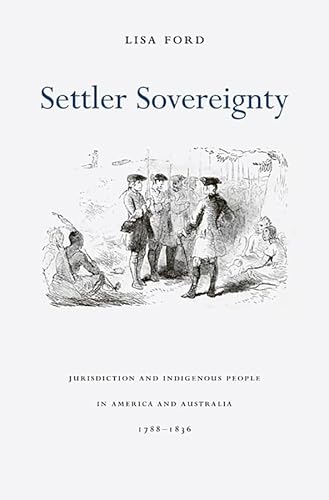Settler Sovereignty
Jurisdiction and Indigenous People in America and Australia, 1788-1836 (Harvard Historical Studies)
Lisa Ford
BOOK REVIEW

In the sweeping landscape of historical narratives, Settler Sovereignty: Jurisdiction and Indigenous People in America and Australia, 1788-1836 emerges as a poignant and compelling exploration that confronts uncomfortable truths about colonialism, legal governance, and the enduring struggles of Indigenous peoples. Lisa Ford deftly navigates the murky waters of settler jurisdiction, revealing how legal frameworks not only shaped colonial ambitions but also systematically displaced and marginalized Indigenous voices.
This book is not merely an academic text; it strikes at the heart of what it means to claim sovereignty over land and people. Ford masterfully juxtaposes the narratives of America and Australia, shedding light on the disturbingly similar trajectories of settler colonialism that affected Indigenous communities in both regions. From the oppressive grasp of the British crown to the burgeoning national identities that emerged, one cannot help but feel the weight of history pressing down, whispering truths that many would rather forget.
Ford's incisive analysis invites readers to confront the stark realities faced by Indigenous populations. You may feel a surge of emotions as you delve into stories of dispossession, cultural erasure, and the attempts at legal recognition. The grim irony lies in the fact that while settlers established their claim to sovereignty through legal means, Indigenous peoples were often rendered invisible within these very legal systems. This is where the brilliance of Ford's argument shines; she captures how the imposition of settler law wrought havoc on Indigenous systems of governance and cultural identity.
Critics of this work have noted its academic rigor-sometimes isolating for a general audience-but what they miss is the human element interwoven throughout the text. Ford does not merely present dry facts; instead, she embeds the experiences of individuals and communities that endured the brunt of these legal machinations. Feedback from readers reveals a mix of admiration for her thorough research and frustration regarding the stark portrayal of colonial history. Some describe her approach as a vital but disheartening reminder of past injustices, echoing the sentiments of many who find it difficult to face these historical narratives without discomfort.
As you navigate through the pages, consider the implications of sovereignty-not just as a legal concept but as a lived reality for those who have been stripped of it. The book deftly entwines the legal and the moral, compelling you to grapple with questions of justice and recognition that are just as pertinent today. Could anything be more disquieting than realizing that the struggles depicted mirror ongoing conflicts over land rights and Indigenous sovereignty in modern contexts?
In light of the recent global movements advocating for Indigenous rights and recognition, Ford's work becomes not just relevant but necessary. It demands that we confront our own complicity in historical injustices and challenges us to re-think the narratives that have long dominated our understanding of both American and Australian histories. The echoes of these struggles resonate in current legal battles and political rallies, making this text a must-read for those yearning for understanding and, perhaps, some semblance of redemption.
With each chapter, the reader is pulled deeper into the intricacies of jurisdiction, governance, and the untold stories of Indigenous peoples. It's a journey that might lead you to tears of solidarity, anger at historical wrongs, and conviction in the need for change. The powerful narratives Ford presents will weave themselves into your consciousness, urging you to reflect and engage with the ideas that shape not only our past but also our future.
The stark sense of urgency embedded in Ford's scholarship screams to be acknowledged; before you close the book, you'll find yourself compelled to share its lessons. The stories of resilience and resistance embedded in the text are not just stories of the past-they are rallies for justice that demand to be heard. It's an invitation to join a larger conversation about rights, recognition, and the rightful place of Indigenous voices in contemporary society.
Dare to dive into Settler Sovereignty and uncover the historical constructs that influence our present. You will emerge not just more informed, but transformed-ready to engage with the complex legacies of colonialism that continue to shape our world today. The journey may not be easy, but it is surely necessary-because the voices of the past deserve to resonate in the halls of our present and future. 🌍
📖 Settler Sovereignty: Jurisdiction and Indigenous People in America and Australia, 1788-1836 (Harvard Historical Studies)
✍ by Lisa Ford
🧾 328 pages
2011
#settler #sovereignty #jurisdiction #indigenous #people #america #australia #17881836 #harvard #historical #studies #lisa #ford #LisaFord